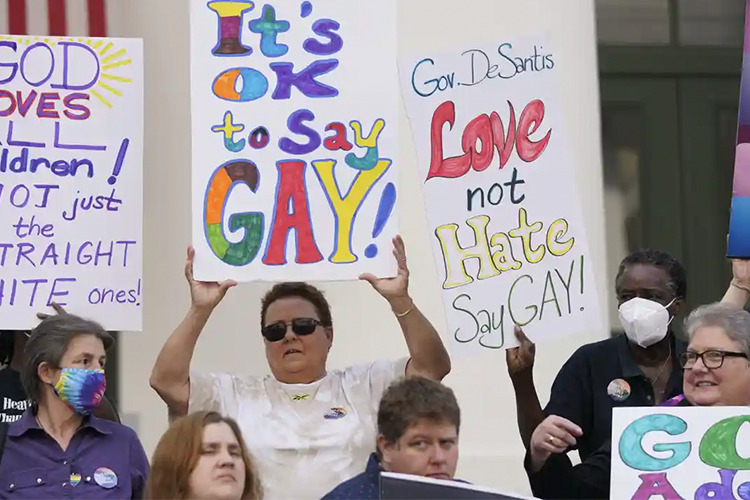
Protesters outside Florida legislation in hopes to stop HB 1557. photo by Wilfredo Lee
Florida lawmakers face controversy over a new house bill that is being passed regarding the discussion of gender and sexual orientation inside the classroom.
On Tuesday, March 8th, 2022, Florida lawmakers made a controversial ruling when the state Senate and House both passed House Bill 1557. This particular bill is set up to ban the inclusion of any discussion, description, or idea of gender and sexual orientation in grades kindergarden to third. On the official Florida Senate website, the draft’s fifth version states that it will be “prohibiting classroom discussion about sexual orientation or gender identity in certain grade levels or in a specified manner.” Legislatures are passing this bill in hopes of providing parents with more control over their children’s education. The fear is that they don’t want their children exposed to anything that parents aren’t comfortable teaching them at home.
One of the biggest debacles over this bill is that people are misinformed about the act. As many Florida state legislators come out in support, their argument is that it is to stop sexual discussions from entering the classroom. In an article published by the Miami Herald, it claims that Republican Governor Robert DeSantis’ campaign believes that it will stop, “R-rated lessons about sexuality.” Republican Senator Dennis Baxley, the bill’s sponsor, believes that if it were amended to focus on sexual activity rather than sexuality and gender orientation, it would “significantly gut the bill’s intent,” leading many people to believe that the true intent is to not prevent any sort of sexual education discussions but to oppress people’s sexual and gender identification.
However, the proposal does not just expand from K-3, it also appeals from grades four and up based on whether it is “age or developmentally appropriate.” This poses the question: how does one measure if a child is developmentally ready for a discussion about gender and sexual orientation? Many children have sparks of curiosity and it can be difficult to have those types of talks, but it may be hard to shut down those curiosities when they don’t fully grasp the idea that the proposition is alluding to.
In addition to teachers not being able to discuss this in the classroom, if parents feel their children have been taught something inappropriate, they can take legal action. In an article from the Washington Post, the bill also claims that it “allows parents to sue… if they think their children have received inappropriate lessons.” Many teachers are at a loss for how to navigate the vagueness of the contents. What can they talk about without actually losing their job or getting sued? Kara Gross, the legislative director and senior policy counsel of the American Civil Liberties Union of Florida, brings up a legitimate concern. “Imagine elementary school students are asked to draw pictures of their families and present them to the class,” she stated. Do teachers forfeit the lesson and not allow all children to participate or do they risk their job? The same concern is matched for teachers and faculty. Are they allowed to share that they have a same-sex partner?
Upon the approval of the measure, there have been many things to come out against the bill. Appearances from Kate McKinnon on SNL’s Weekend Update to becoming a news segment on Last Week Tonight with John Oliver have sparked interest from people all around. Companies have publicly condemned or contributed financial support to the bill’s passing, one of the biggest being DisneyWorld. Bob Chapek, Disney’s CEO, found himself in a bit of a constricted situation, as many people called for Disney to publicly oppose the bill. Many of the workers and even Chapek’s predecessor Robert A. Iger had all taken to Twitter against the bill. In a virtual meeting, Chapek made an off camera remark, “We were opposed to the bill from the outset, and we chose not to take a public position because we felt we could be more effective working behind the scenes directly with lawmakers on both sides of the aisle,” according to The New York Times.
With a lot of the hate that LGBTQ+ community has received within the past decade in the state of Florida, what does this mean moving forward? How will this affect talking about incidents like the Pulse nightclub shooting? So far, the bill has only passed through the state House and Senate, yet there are no updates of any official hearings through Washington D.C. or the Supreme Court.